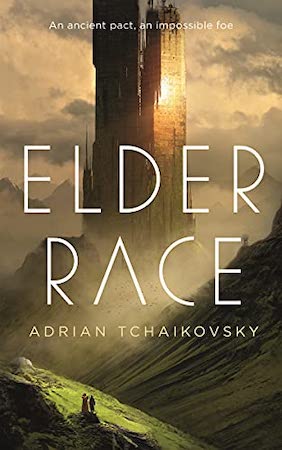Could a story that’s steeped in darkness end up being delightfully sweet? Yes, provided that it’s written by T. Kingfisher, who possesses a remarkable aptitude at taking well-known fairy tales and standing them on their head…
Toadling is a changeling, a human baby swapped by the fairies for one of their own and later thoughtlessly discarded and forgotten. Despite being given to the Greenteeth, the flesh-eating swamp dwellers, she is not devoured but rather accepted and loved and taught some magic, including the ability to turn into a frog – hence her name. When we meet her, she’s been standing watch over a bramble-covered tower for a long time, living in fear that someone might approach and try to wake the princess lying at the top of the tower, because that would unleash something terrible. So that when knight Halim enters her domain, brought by the whispers of a story about a sleeping princess, Toadling tries her best to stop him, and so… Well, that’s enough, you had better discover the rest by yourselves 😉
Once again I loved how this author can take one of the most famous fairy tales, that of Sleeping Beauty, and turn it inside out while creating a heroine who might not be either beautiful or talented, but who possesses a well of determination and courage that make her stand out and that ultimately win Halim’s trust and help in trying to lift the curse. In a way, completely subverting the classic plot of this fairy tale, the arrival of the knight does affect an awakening but it’s not that of the princess – rather it’s Toadling’s, who had been spiritually “hibernating” for so long while keeping watch on the tower and on its slumbering guest. These two characters play their part delightfully well: Toadling by her self-effacing and timid demeanor that overlays an admirable dedication to her duty, truly above and beyond what could be expected; and Halim, who candidly admits to not being much of a knight or a warrior, but who knows how to listen and often shows the endearing trait of apologizing for his verbal outbursts.
The overturning of the classic storyline goes on with the depiction of other characters, so that we see the fairies as the tale’s “bad guys”, first because they exchange babies on a whim, without a real reason for the act, and then because they try to correct a potentially deadly mistake by sending someone who is ill-suited to the task, with disastrous consequences. Forget the fairy godmothers of old, because here you will not find any of them – on the contrary, you will encounter more love and nurturing attitude among the “monsters”, the Greenteeth with whom Toadling grows up and to whom she longs to return, who look far more human than the supposedly beautiful fae.
Another very enjoyable story from an author who I’m sure will never prove disappointing…

















You must be logged in to post a comment.